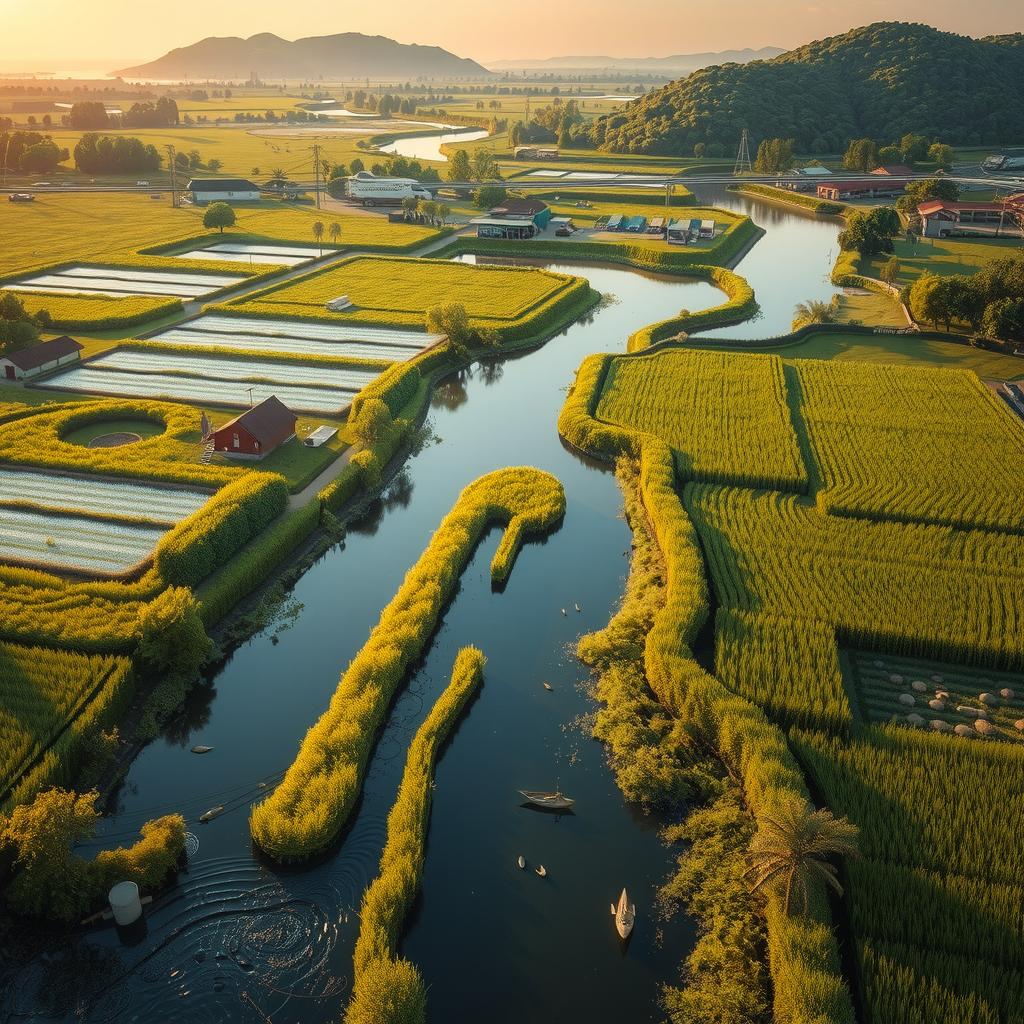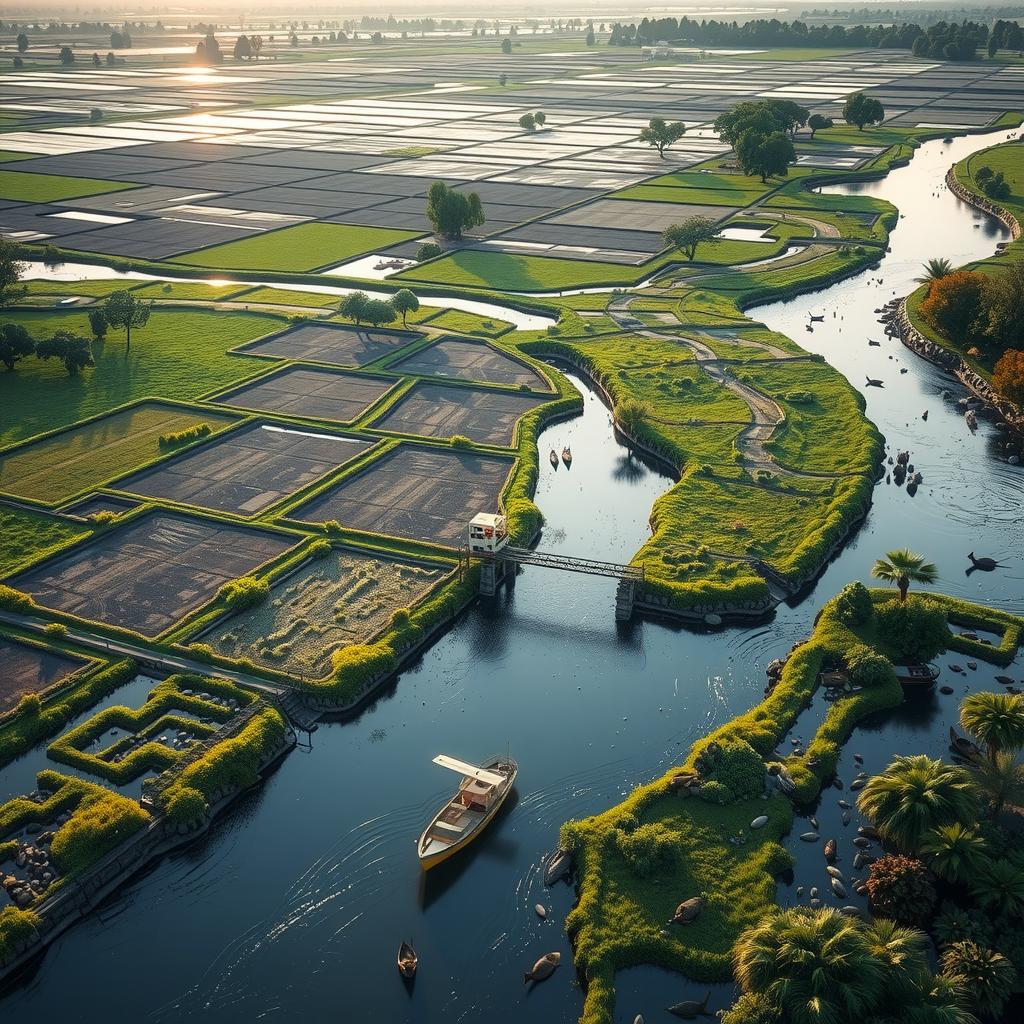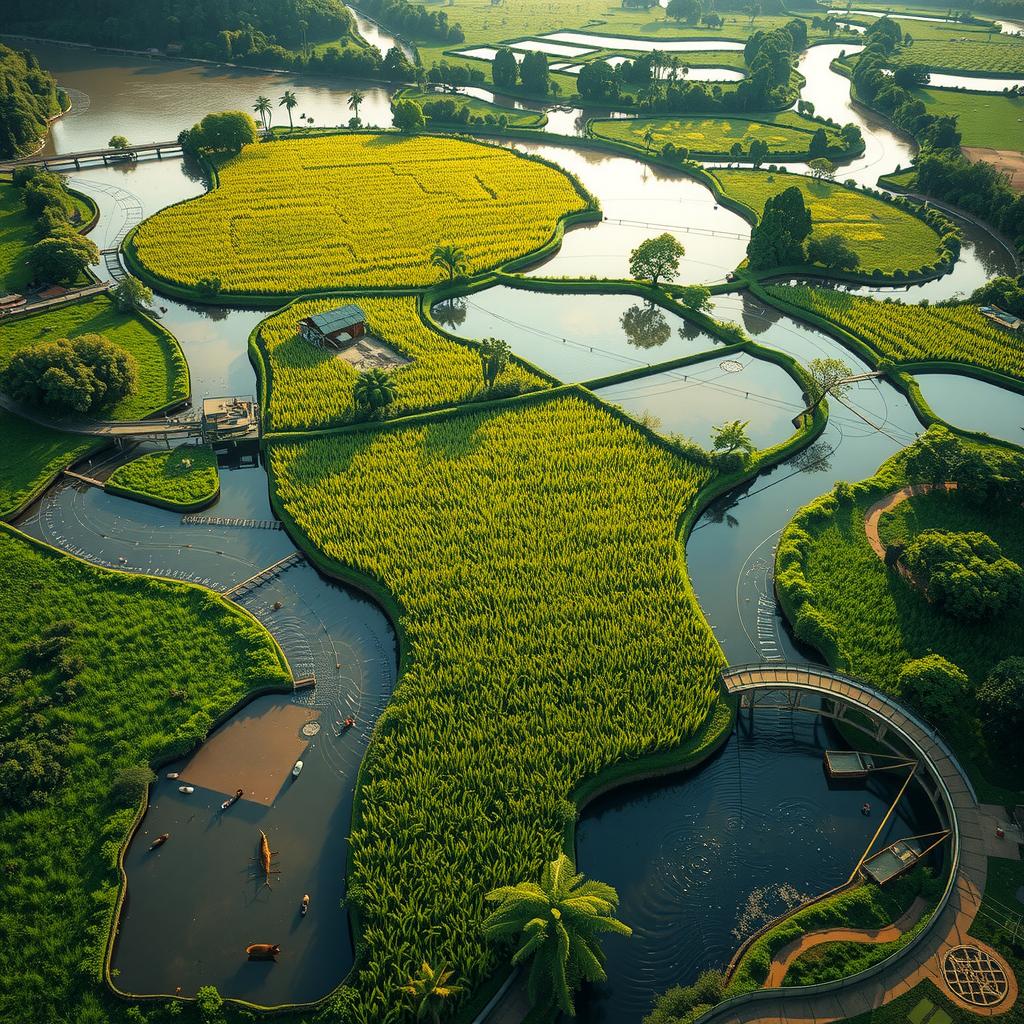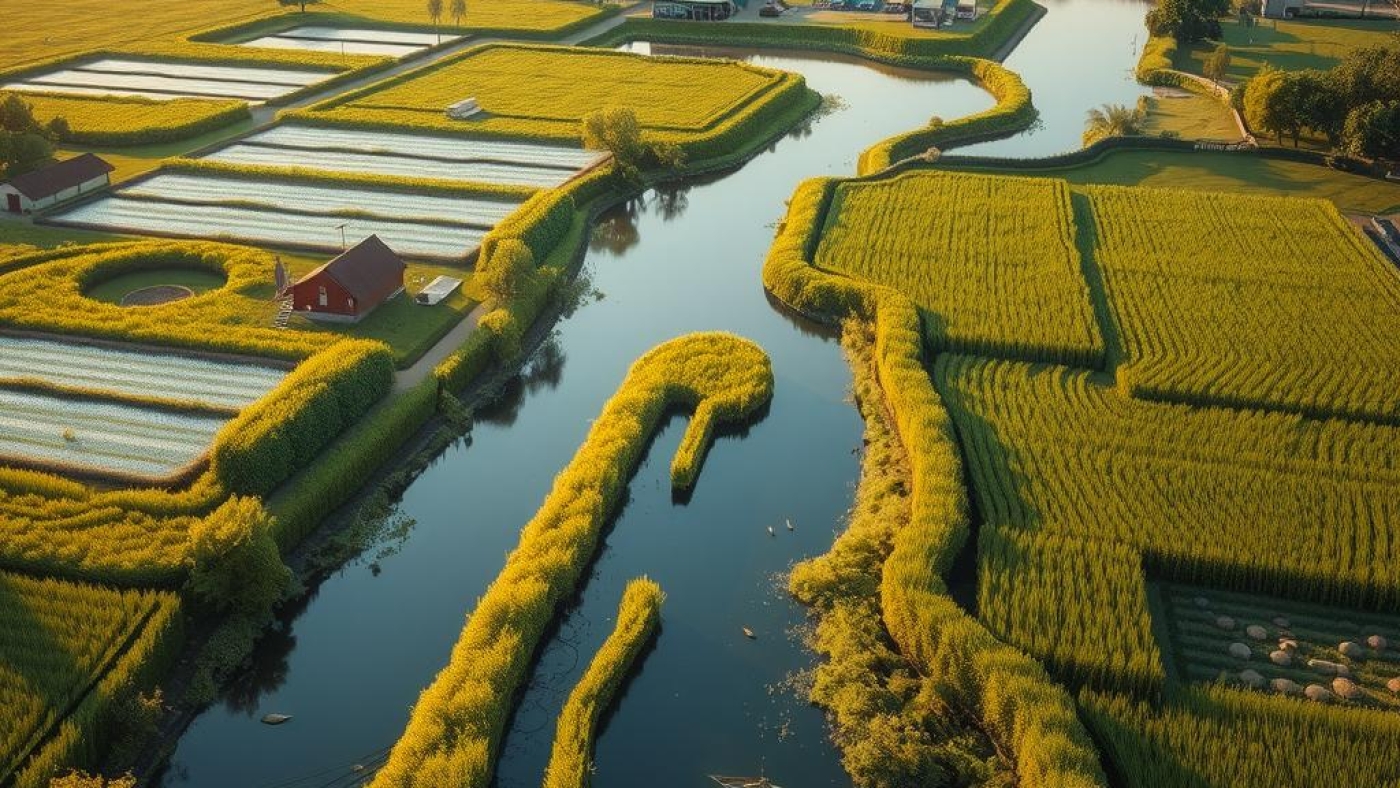Water is a precious resource that is crucial for human survival, economic development, and environmental sustainability. As the demand for water increases due to population growth, industrialization, and climate change, effective water resource management has become a pressing global issue. In this context, the Water Resource Management and Travel guide aims to provide travelers with valuable insights and practical solutions for preserving and conserving water during their journeys.
Sustainable tourism is a growing trend that encourages travelers to be mindful of their environmental impact, including their water usage. By understanding the principles of water resource management, travelers can make informed decisions and contribute to the conservation of vital water sources. The Water Resource Management and Travel guide delves into the importance of water conservation, exploring strategies such as using low-flow showers, implementing rainwater harvesting systems, and being mindful of water scarcity in different destinations.
During peak tourist seasons, the strain on local water resources can be particularly acute, as the influx of visitors puts additional pressure on already limited supplies. The Water Resource Management and Travel guide offers valuable information on how travelers can support local water resource management projects and engage with communities to protect vital water sources. By fostering a deeper understanding of the challenges faced by local communities, travelers can become agents of positive change, contributing to the long-term water resource protection and the overall sustainability of the tourism industry.
The Water Resource Management and Travel guide also delves into the importance of sustainable tourism practices, highlighting how travelers can minimize their water footprint and contribute to the preservation of natural ecosystems. From practical tips on water-efficient hotel stays to guidance on exploring destinations with a focus on water resource management, this comprehensive resource empowers travelers to make a difference in their travels.
By equipping travelers with the knowledge and tools to manage water resources responsibly, the Water Resource Management and Travel guide promotes a more mindful and sustainable approach to tourism. This valuable resource aims to inspire travelers to become active participants in the global effort to protect and conserve our most precious natural resource – water.

Key Points:
-
Addressing Water Scarcity: Water Resource Management and Travel plays a crucial role in addressing the global issue of water scarcity, particularly during peak tourist seasons when water demand can exceed supply. Sustainable tourism advocates champion water conservation measures to mitigate this challenge.
-
Water Conservation Measures: Sustainable tourism practices recommend the implementation of low-flow showers and toilets, as well as the installation of rainwater harvesting systems, to reduce water consumption and promote water resource conservation.
-
Local Engagement: Tourists can actively engage in local water resource management projects to help protect vital water sources and contribute to the preservation of these important resources.
-
Rainwater Harvesting Systems: The integration of rainwater harvesting systems into Water Resource Management and Travel initiatives can provide a reliable and sustainable source of water, reducing the strain on existing water resources.
-
Collaborative Efforts: Partnerships between tourism stakeholders, local communities, and water resource management authorities can foster collaborative approaches to addressing water scarcity and ensuring the long-term sustainability of Water Resource Management and Travel.

Addressing Water Scarcity in Travel Destinations
Sustainable Tourism Initiatives for Water Conservation
Sustainable travel has become increasingly crucial as destinations worldwide face the challenge of water scarcity. During peak tourist seasons, the demand for water resources can significantly strain local supplies, necessitating the implementation of effective water conservation strategies. This article explores how Water Resource Management and Travel can help address this pressing issue, highlighting sustainable tourism initiatives that promote water conservation and management.
One of the primary focuses of Water Resource Management and Travel is to encourage the adoption of water-saving practices in travel destinations. This includes the installation of low-flow showers and water-efficient appliances in accommodation facilities, as well as the implementation of rainwater harvesting systems to supplement traditional water sources. By reducing water consumption and diversifying water supplies, these initiatives help alleviate the strain on vital water sources during high tourist traffic.
Furthermore, Water Resource Management and Travel advocates for the development of local water resource management projects that engage with the community. These projects often involve collaborating with stakeholders, such as local authorities, businesses, and residents, to identify and address water-related challenges specific to the destination. For example, some destinations have implemented community-based programs that educate travelers on water conservation practices, empowering them to be active participants in the sustainable management of water resources.
In addition to water-saving measures, Water Resource Management and Travel also emphasizes the importance of protecting and preserving local water resources. This may involve initiatives that monitor and safeguard water quality, as well as efforts to restore and maintain the health of watersheds and aquifers. By taking a comprehensive approach to water resource management, destinations can ensure the long-term viability of their water supplies, even during peak tourist seasons.
Addressing Water Scarcity in Arid Destinations
Arid and semi-arid destinations often face the most pressing water scarcity challenges, as they are inherently limited in their water resources. Water Resource Management and Travel recognizes the unique needs of these destinations and provides tailored solutions to enhance water conservation and management. This includes the implementation of advanced water treatment and desalination technologies, as well as the promotion of water-efficient irrigation practices in agriculture and landscaping.
Furthermore, Water Resource Management and Travel encourages the development of innovative water storage and distribution systems in arid regions. These systems can help capture and store rainfall, as well as efficiently distribute water to various sectors, including the tourism industry. By diversifying water sources and improving distribution, destinations can better meet the water demands of both residents and visitors.
Collaboration and knowledge-sharing are also crucial components of Water Resource Management and Travel’s approach to addressing water scarcity in arid destinations. The organization facilitates the exchange of best practices and the implementation of successful water conservation and management initiatives across different regions, enabling destinations to learn from one another and adapt proven strategies to their local contexts.
Empowering Local Communities for Sustainable Water Management
Sustainable tourism is not just about implementing water-saving technologies and infrastructure; it also requires the active engagement and empowerment of local communities. Water Resource Management and Travel recognizes the importance of incorporating local knowledge and perspectives into water resource management strategies.
Through its programs, Water Resource Management and Travel works closely with community-based organizations and local stakeholders to develop and implement water conservation initiatives that are tailored to the unique needs and cultural practices of each destination. This approach not only ensures the long-term sustainability of water resource management but also fosters a sense of ownership and responsibility among local communities.
By empowering local communities, Water Resource Management and Travel helps to build resilience and adaptive capacity in the face of water scarcity challenges. This includes supporting the development of local water resource management projects, providing training and capacity-building opportunities, and facilitating the integration of traditional water management practices with modern technologies and approaches.
Overall, Water Resource Management and Travel plays a crucial role in addressing water scarcity in travel destinations by promoting sustainable tourism initiatives, collaborating with local stakeholders, and empowering communities to take an active role in the management of their water resources.

Travelers as Stewards of Local Water Resources
Explore Your Water Footprint on Vacation
When traveling, the amount of water consumed can significantly impact local water resources, especially in regions facing water scarcity. As responsible tourists, we have the opportunity to reduce our water footprint and support community-based water resource management projects. One way to do this is by being mindful of our water usage during our travels, such as opting for low-flow showers, reusing towels, and avoiding unnecessary laundry. By making small adjustments to our water-related habits, we can contribute to the preservation of vital water sources.
Engage with Local Water Conservation Initiatives
Many destinations around the world are implementing innovative community-based water resource management projects to address local water challenges. As travelers, we can seek out opportunities to learn about and support these initiatives. This might involve volunteering with organizations that promote rainwater harvesting, participating in educational workshops on sustainable water use, or even donating to fund water infrastructure improvements. By actively engaging with these projects, we can gain a deeper understanding of the water-related issues faced by the local community and contribute to their long-term solutions.
Advocate for Water Resource Protection
During our travels, we can also play a role in advocating for the protection of local water resources. This might involve learning about the water scarcity challenges faced by the destination, understanding the impact of peak tourist seasons on water availability, and raising awareness among fellow travelers. By sharing our knowledge and encouraging others to adopt water-conscious behaviors, we can inspire a collective effort to safeguard vital water sources. Additionally, we can engage with local policymakers or community leaders to understand their efforts in water resource management and explore ways to support their initiatives.
Embrace Water-Efficient Accommodations
When planning our travels, we can also seek out accommodations that prioritize water conservation. This might include hotels or resorts that have implemented water-efficient technologies, such as low-flow showers, rainwater harvesting systems, or advanced wastewater treatment. By choosing these types of accommodations, we not only reduce our personal water consumption but also support businesses that are actively contributing to the sustainable management of local water resources.
Spread Awareness and Inspire Action
As stewards of local water resources, we can share our experiences and insights with our social networks, inspiring others to adopt water-conscious behaviors during their travels. By sharing stories, tips, and success stories of community-based water resource management projects, we can encourage a ripple effect of awareness and action, empowering more travelers to become active participants in preserving the world’s vital water sources.
Innovative Water Solutions for the Tourism Industry – Learn about cutting-edge technologies and practices
Water Conservation Strategies for Sustainable Tourism
The tourism industry has long grappled with the challenge of managing water resources effectively, especially in regions facing water scarcity. However, the emergence of innovative water conservation technologies and practices is revolutionizing the way hotels, resorts, and other tourism-related businesses approach water management. Water Resource Management and Travel, a pioneering solution, is at the forefront of this transformation, offering comprehensive strategies to optimize water usage and minimize environmental impact.
One of the key aspects of Water Resource Management and Travel is the implementation of low-flow showers and other water-efficient fixtures. By replacing traditional showerheads and faucets with low-flow alternatives, hotels can significantly reduce their water consumption without compromising the guest experience. This approach not only conserves precious water resources but also helps to alleviate the strain on local water sources, particularly during peak tourist seasons when demand for water is at its highest.
Another innovative solution championed by Water Resource Management and Travel is rainwater harvesting. By capturing and repurposing rainwater for non-potable uses, such as landscape irrigation and toilet flushing, hotels can dramatically reduce their reliance on municipal water supplies. This technology not only helps to conserve water but also contributes to the overall sustainability of the tourism industry by reducing the burden on vital water sources.
In addition to these technological advancements, Water Resource Management and Travel also emphasizes the importance of water resource protection and responsible water management practices. Through collaboration with local authorities and the implementation of water-sensitive landscaping, hotels can actively contribute to the preservation of the surrounding ecosystem and ensure the long-term viability of water resources. By fostering a culture of water conservation and environmental stewardship, the tourism industry can set an example for sustainable development and responsible resource utilization.
Harnessing Cutting-Edge Water Technologies for the Tourism Sector
As water scarcity becomes an increasingly pressing global issue, the tourism industry must adapt and adopt innovative solutions to ensure the sustainability of its operations. Water Resource Management and Travel offers a comprehensive approach to water resource management, integrating a suite of cutting-edge technologies and best practices to address the unique challenges faced by the tourism sector.
One of the standout features of Water Resource Management and Travel is its focus on water metering and monitoring. By installing smart water meters and implementing robust data analytics, hotels can gain unprecedented insights into their water consumption patterns, allowing them to identify and address areas of excessive use. This data-driven approach empowers hotel managers to make informed decisions, implement targeted water-saving initiatives, and track the effectiveness of their efforts over time.
In addition to water metering, Water Resource Management and Travel also incorporates advanced water treatment and recycling technologies. Through the use of on-site water treatment systems, hotels can reclaim and reuse greywater (from sinks, showers, and washing machines) for non-potable applications, such as landscape irrigation and toilet flushing. This circular approach to water management not only reduces the overall water footprint of the hotel but also helps to mitigate the strain on local water resources.
Furthermore, Water Resource Management and Travel emphasizes the importance of stakeholder engagement and collaborative water resource management. By fostering partnerships with local authorities, environmental organizations, and the surrounding community, hotels can contribute to the development of comprehensive water resource protection strategies. This collaborative approach ensures that the tourism industry’s water-related initiatives are aligned with the broader goals of sustainable development and environmental conservation.
Through the adoption of Water Resource Management and Travel, the tourism industry can lead the way in demonstrating the potential of innovative water solutions. By embracing cutting-edge technologies and fostering a culture of water stewardship, hotels and resorts can not only reduce their environmental impact but also contribute to the long-term resilience of the communities in which they operate.
Sustainable Water Conservation Practices
Reducing Water Consumption and Harvesting Rainwater
In the context of water resource management and sustainable tourism, low-flow fixtures and rainwater harvesting are two effective strategies that can significantly reduce water consumption and alleviate pressure on vital water sources, especially during peak tourist seasons. The Water Resource Management and Travel approach emphasizes the importance of adopting such sustainable water conservation practices to ensure the long-term viability of local water resources.
Low-flow fixtures, such as showerheads, faucets, and toilets, are designed to use less water without compromising performance or user experience. These fixtures are engineered to deliver the same level of functionality while significantly reducing water usage, often by as much as 30% or more compared to traditional fixtures. By installing low-flow fixtures in accommodations, hotels, and other tourism-related facilities, the Water Resource Management and Travel initiative helps to lower the overall water demand, thereby conserving precious water resources and mitigating water scarcity issues.
In addition to low-flow fixtures, rainwater harvesting is another innovative approach that Water Resource Management and Travel promotes. This method involves the collection, storage, and utilization of rainwater, which can be used for a variety of non-potable applications, such as landscape irrigation, toilet flushing, and even some industrial processes. By capturing and utilizing rainwater, the pressure on local water resource management projects and vital water sources is reduced, especially during periods of high tourist influx or drought.
The implementation of low-flow fixtures and rainwater harvesting systems not only contributes to water conservation but also aligns with the broader goals of sustainable tourism. By reducing water consumption and diversifying water sources, these strategies help to protect the local water resource management and ensure the long-term viability of tourism-dependent communities. Furthermore, the adoption of these practices can serve as a model for other destinations, promoting the wider application of water resource protection measures within the tourism industry.
Sustainable Water Management in Hotels and Resorts
Reducing Water Consumption through Innovative Practices
Hotels and resorts around the world are increasingly implementing innovative strategies to reduce their water consumption and promote sustainability. One of the key areas of focus is the implementation of water-efficient technologies and practices that help conserve this vital resource.
Many hotels and resorts have begun installing low-flow showerheads and faucets, which can significantly reduce water usage without compromising the guest experience. Additionally, some establishments have adopted advanced rainwater harvesting systems, allowing them to repurpose rainwater for activities such as landscape irrigation and toilet flushing. These measures not only conserve water but also help reduce the strain on local water sources, particularly during peak tourist seasons when water demand can be at its highest.
Furthermore, hotels and resorts are increasingly partnering with local water resource management projects to support sustainable water conservation efforts in the communities in which they operate. By collaborating with these initiatives, they can contribute to protecting vital water sources and ensuring long-term water security for both their guests and the local population.
Enhancing Guest Awareness and Participation
In addition to implementing water-saving technologies, hotels and resorts are also focusing on educating and engaging their guests in sustainable water practices. This includes providing clear instructions and reminders on how guests can help conserve water during their stay, such as by reusing towels and linens, taking shorter showers, and reporting any leaks or water-related issues.
Some establishments have even gone a step further by offering incentives or rewards to guests who actively participate in water conservation efforts. This not only encourages guest involvement but also helps to build a sense of shared responsibility for protecting the environment.
Integrating Water Management into Sustainable Operations
The commitment to sustainable water management extends beyond just the guest experience. Hotels and resorts are also integrating water conservation strategies into their overall operational practices, ensuring that water efficiency is a priority across all facets of their business.
This includes implementing water-efficient laundry and cleaning processes, optimizing irrigation systems for landscaping, and exploring innovative water recycling and treatment technologies. By taking a holistic approach to water management, these establishments are able to significantly reduce their water consumption and minimize their environmental impact.
Addressing Water Scarcity and Promoting Resilience
In regions facing water scarcity, hotels and resorts are playing a crucial role in addressing this challenge and promoting resilience. These establishments are working closely with local authorities and water resource management experts to develop tailored solutions that can help alleviate water stress and ensure the long-term sustainability of their operations.
Some of these solutions may include the use of desalination or water reclamation systems, the implementation of advanced irrigation techniques, and the exploration of alternative water sources, such as groundwater or seawater. By addressing water scarcity head-on, hotels and resorts can not only reduce their own water consumption but also contribute to the broader efforts to protect and conserve this precious resource.
Collaboration and Shared Responsibility
Ultimately, the success of sustainable water management in hotels and resorts lies in the ability to foster collaboration and shared responsibility among all stakeholders, including guests, local communities, and industry partners. By working together, these establishments can develop and implement comprehensive water conservation strategies that have a lasting impact on the environment and the communities they serve.
Navigating the Waters: Sustainable Travel and Water Resource Management
As water scarcity becomes an increasingly pressing global issue, particularly during peak tourist seasons, the need for sustainable tourism practices that prioritize water conservation has never been more critical. Water Resource Management and Travel advocates for the implementation of various water-saving measures, such as low-flow showers and toilets, as well as the adoption of rainwater harvesting systems. Tourists can also engage in local water resource management projects to help protect vital water sources and contribute to the overall sustainability of the destination.
-
Promoting Water Conservation in the Tourism Industry
- Water Resource Management and Travel encourages tourism establishments to adopt water-efficient technologies, such as low-flow showers and toilets, to reduce water consumption.
- Water Resource Management and Travel also recommends the implementation of rainwater harvesting systems to capture and reuse rainwater for various non-potable purposes, such as landscape irrigation and toilet flushing.
-
Engaging Tourists in Local Water Resource Management
- Water Resource Management and Travel encourages tourists to participate in local water resource management projects, such as beach cleanups, river restoration initiatives, and educational programs, to help protect and preserve vital water sources.
- By actively engaging in these projects, tourists can gain a deeper understanding of the local water challenges and contribute to the long-term sustainability of the destination.
-
Promoting Awareness and Education
- Water Resource Management and Travel aims to raise awareness among tourists about the importance of water resource management and the impact of their travel choices on water resources.
- Educational initiatives, such as informational displays and interactive workshops, can help tourists learn about water-saving practices and the role they can play in conserving water during their travels.
-
Collaborating with Local Communities
- Water Resource Management and Travel advocates for partnerships between tourism operators and local communities to develop and implement sustainable water resource management strategies.
- By working closely with local stakeholders, tourism businesses can better understand the unique water challenges faced by the community and develop tailored solutions to address them.
-
Encouraging Sustainable Destination Management
- Water Resource Management and Travel promotes the adoption of sustainable destination management practices that prioritize water resource management and conservation.
- This includes the development of comprehensive water management plans, the implementation of water monitoring and reporting systems, and the integration of water resource management considerations into overall destination planning and development.
FAQ:
Q: What are some water conservation measures recommended by Water Resource Management and Travel?
A: Water Resource Management and Travel recommends the adoption of low-flow showers and toilets, as well as the implementation of rainwater harvesting systems, to reduce water consumption in the tourism industry.
Q: How can tourists engage in local water resource management projects?
A: Water Resource Management and Travel encourages tourists to participate in local projects, such as beach cleanups, river restoration initiatives, and educational programs, to help protect and preserve vital water sources.
Q: Why is it important for tourism businesses to collaborate with local communities on water resource management?
A: Water Resource Management and Travel advocates for partnerships between tourism operators and local communities to develop and implement sustainable water resource management strategies, as this allows for a better understanding of the unique water challenges faced by the community and the development of tailored solutions.
Q: What are some sustainable destination management practices that prioritize water resource management?
A: Water Resource Management and Travel promotes the adoption of comprehensive water management plans, the implementation of water monitoring and reporting systems, and the integration of water resource management considerations into overall destination planning and development.
Q: How does Water Resource Management and Travel aim to raise awareness about the importance of water resource management among tourists?
A: Water Resource Management and Travel aims to raise awareness through educational initiatives, such as informational displays and interactive workshops, to help tourists learn about water-saving practices and the role they can play in conserving water during their travels.
